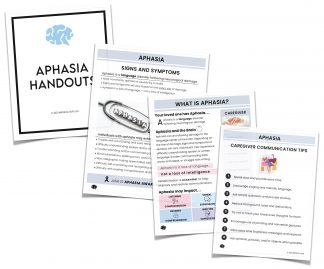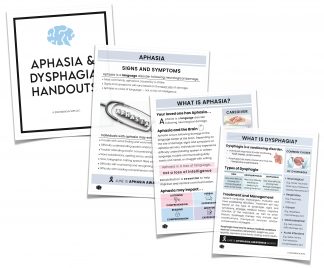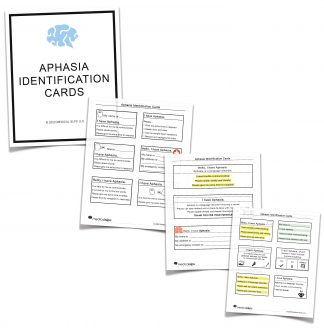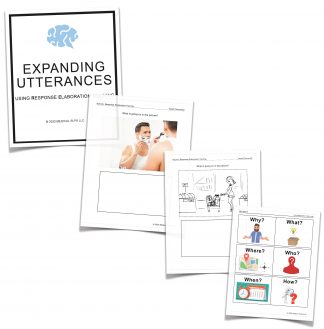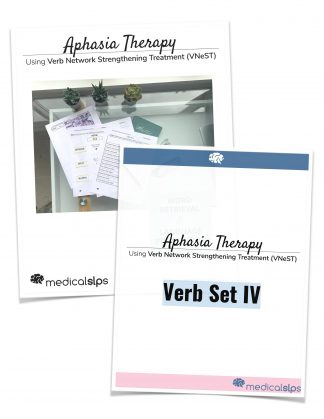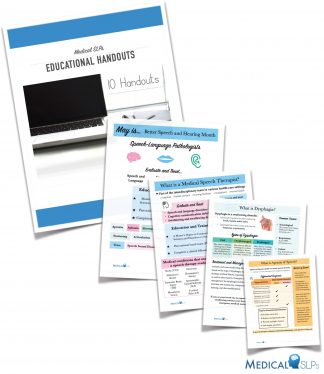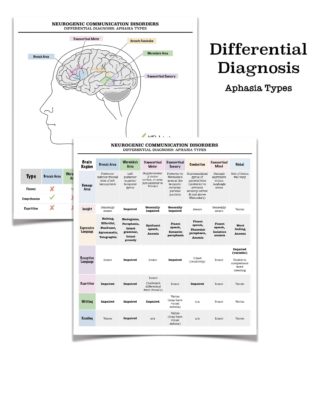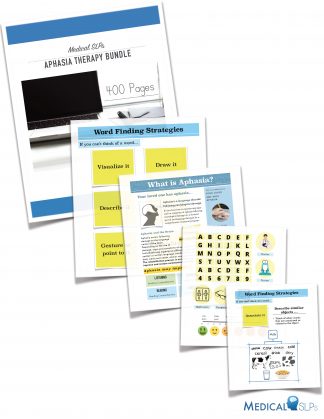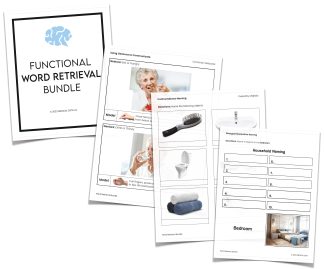Aphasia
Speech therapy activities, worksheets, evaluations, and handouts for aphasia.
Showing all 15 resultsSorted by latest
-
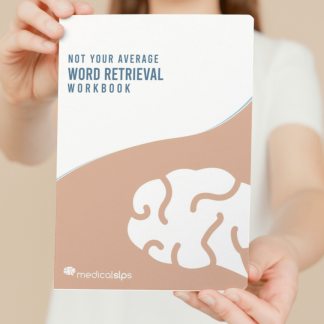
Not Your Average Word Retrieval Workbook
Sale!The Word Retrieval Workbook includes a variety of speech therapy resources and functional activities that can be used to target word finding deficits. Individuals with word finding deficits typically know what they want to say, but experience difficulty finding the right words to speak. This workbook contains 180+ pages and each section includes suggestions for use, sample short-term goals, cueing examples, and much more!
https://medicalslps.com/wp-content/uploads/2022/08/IMG_4727.mov
$99.99Original price was: $99.99.$79.99Current price is: $79.99. Buy on Amazon -
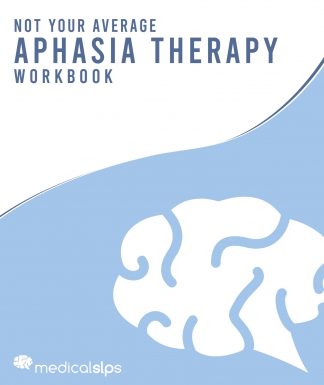
Not Your Average Aphasia Therapy Workbook
Rated 5.00 out of 5Sale!450+ page hard copy fulfilled by Amazon
The Aphasia Therapy Workbook is divided into four parts and includes 450+ pages of functional therapy materials that can be used to target a variety of receptive and expressive language skills in persons with aphasia. Each section features research-based techniques, therapy ideas, treatment tasks, sample goals, and much more. Designed to support both new and experienced clinicians, this comprehensive workbook contains practical and relevant resources to treat aphasia.
Discounted with your Amazon Prime membership!
What’s inside!
$124.99Original price was: $124.99.$99.00Current price is: $99.00. Buy on Amazon -
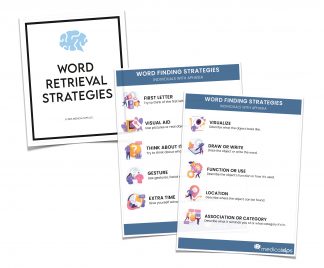
Word Retrieval Strategies
$9.99 Add to cartWord retrieval strategies for Aphasia:
- FIRST LETTER
Try to think of the first letter. Scan the alphabet for help. - VISUAL AID
Use pictures or real objects. - THINK ABOUT IT
Try to think about what you want to say before you say it. - GESTURE
Use gestures, facial expressions, and pointing. - EXTRA TIME
Give yourself extra time, the word may come to you. - VISUALIZE
Describe what the object looks like. - DRAW OR WRITE
Draw the object or write the word. - FUNCTION OR USE
Describe the object’s function or how it’s used. - LOCATION
Describe where the object can be found. - ASSOCIATION OR CATEGORY
Describe what it reminds you of or what category it’s in.
- FIRST LETTER
-
Handout: Aphasia
$0.00 Add to cartWhat is Aphasia?
Aphasia is a language disorder following neurological damage, most commonly, caused by a stroke. Depending on the site of damage, signs and symptoms of aphasia will vary. Individuals may experience difficulty understanding spoken or written language, trouble communicating daily wants and needs, or struggle with writing. Aphasia is a loss of language — not a loss of intelligence.
-
Aphasia & Dysphagia Handouts
Rated 4.50 out of 5Sale!7 handouts for Aphasia and Dysphagia
$4.99Original price was: $4.99.$0.00Current price is: $0.00. Add to cart -
Aphasia Identification Cards
Rated 5.00 out of 5Sale!This resource includes 27 aphasia identification wallet cards. Print, personalize, and provide these cards to your clients with aphasia to support daily communication exchanges.
$9.99Original price was: $9.99.$4.99Current price is: $4.99. Add to cart -
Expanding Utterances Using Response Elaboration Training
$19.99 Add to cartResponse Elaboration Training (RET; Kearns, 1985) is a treatment technique that focuses on expanding utterances and increasing content words in conversations in persons with aphasia (PWA) (Kearns, 1985; Gaddie, Kearns, & Yedor, 1991). This resource includes information on how to use RET, sample treatment goals, a data tracking form, visual prompts, 49 action target pictures (colored photographs and line drawings), and clinician elaboration examples.Kearns, K.P. (1985). Response elaboration training for patient initiated utterances. Clinical Aphasiology, 15, 196-204.
Gaddie, A, Kearns, K.P., & Yedor, K. (1991). A qualitative analysis of response elaboration training effects. Clinical Aphasiology, 19, 171-183.
-
VNeST – Set IV
$9.99 Add to cartSet IV – Verbs: serve, shoot, sign, sort, study, teach, throw, trap, wash, weigh, write
Introduction
Verb Network Strengthening Treatment (VNeST) is an evidence-based technique that focuses on using verbs to target word retrieval and discourse for persons with aphasia. This intervention has shown promising evidence for language production and generalization of lexical retrieval to trained and untrained verbs (Edmonds & Babb, 2011; Edmonds et al., 2014; Edmonds et al., 2009). This resource saves you time and includes everything you need to begin using VNeST with your clients.
Included…
- Each set includes *11 sample verbs
- No prep templates (for each step of protocol)
- Sample responses (for each verb)
- Client data tracking forms
- Clinician cueing guide
- Sample cues (semantic, multiple choice, & picture prompts)
- Semantic judgement sentences (12 for each verb)
Edmonds, L. A. (2014). Tutorial for Verb Network Strengthening Treatment (VNeST): Detailed Description of the Treatment Protocol with Corresponding Theoretical Rationale. SIG 2 Perspectives on Neurophysiology and Neurogenic Speech and Language Disorders, 24, 78-88.
Edmonds, L. A. (2016). A Review of Verb Network Strengthening Treatment. Topics in Language Disorders, 36, 123-135.
Edmonds, L. A., & Babb, M. (2011). Effect of Verb Network Strengthening Treatment in moderate-to-severe aphasia. American Journal of Speech-Language Pathology, 20, 131-145.
Edmonds, L.A., Mammino, K., & Ojeda, J. (2014). Effect of Verb Network Strengthening Treatment (VNeST) in persons with aphasia: Extension and replication of previous findings. American Journal of Speech-Language Pathology, 23, S312-S329.
Edmonds, L. A., Nadeau, S., & Kiran, S. (2009). Effect of Verb Network Strengthening Treatment (VNeST) on lexical retrieval of content words in sentences in persons with aphasia. Aphasiology, 20, 644-675.
-
Copy And Recall Treatment (CART) Worksheets
$9.99 Add to cartCopy And Recall Treatment (CART) Worksheets (80+ pages and 120 sample target images)
CART is a lexical writing treatment technique focused on improving writing skills for communication in individuals with severe aphasia (Beeson, 1999; Beeson, et al., 2002). Stimuli selected should be personalized and relatable to each client. Practice includes copying target words and progresses to writing words from recall. The CART protocol includes training functional words in sets of five and incorporates a daily homework component six days a week (Beeson, et al., 2002). The activities in this packet were adapted from and are based on the CART protocol (Beeson, et al., 2002).
Beeson, P.M. (1999). Treating acquired writing impairment. Strengthening graphemic representations. Aphasiology, 13(9-11), 767-785.
Beeson, P. M., Hirsch, F. M., & Rewega, M. A. (2002). Successful single-word writing treatment: Experimental analyses of four cases. Aphasiology, 16(4-6), 473-491.
-
Educational Handouts Bundle
Sale!10 Educational Handouts included in this bundle:
– What is Dysphagia?
– Dysphagia: Signs and Symptoms
– Dysphagia and Oral Care
– Dysphagia and Safe Swallowing
– What is Aphasia?
– Aphasia Differential Diagnosis
– What is Apraxia of Speech?
– What is Dysarthria?
– What is a Medical Speech Therapist?
– Better Speech and Hearing Month Handout$4.99Original price was: $4.99.$0.00Current price is: $0.00. Add to cart -
Aphasia Object Box Starter Kit
$14.99 Add to cartThis starter kit guides you to create your own object box with household items and successfully use it to address goals for verbal and written expression, auditory and reading comprehension, and cognitive communication skills.
Includes:
30 Object picture cards
• 2 Images + 1 symbol each
• 6 Visual cue cards
• Written word
• Word completion
• Phrase completion
• Description of object use, location, and properties
• Clinician prompt card
- Verbal expression
- Confrontational naming
- Object description
- Phrase completion
- Generative naming
- Auditory comprehension
- Object discrimination
- Following directions
- Reading comprehension
- Word recognition
- Phrase/Sentence discrimination
- Written expression
- Word completion
- Word/phrase/sentence level
- Cognitive communication
- Memory
- Problem solving/reasoning/WH-questions
- Categorical organization
- Verbal expression
-
Handout: Aphasia Differential Diagnosis Chart
Sale!Differential diagnosis (DDX) for types of aphasia with impacted brain regions (Broca’s area, trancortical motor, trancortical sensory, conduction, transcortical mixed, global) and communication impact/disorders (expressive language, receptive language, repetition, writing, and reading).
This item is included in the Speech-Language Pathology (SLP) Praxis Study Guide
$0.99Original price was: $0.99.$0.00Current price is: $0.00. Add to cart -
Handout: Wernicke’s Aphasia
$0.00 Add to cartPrintable caregiver handout for patient families and around your workplace.
-
Aphasia Therapy Workbook
Rated 5.00 out of 5$29.99 Add to cartThe Aphasia Therapy Bundle includes 350+ pages of printable activities, educational handouts, documentation examples, and more. Includes worksheets for receptive language, expressive language, written language. This bundle may provide helpful resources, treatment materials, and home practice for patients with aphasia. Each section provides ideas for treatment, sample goals, and cueing examples. Manipulate materials and personalize for your clients to promote individualized speech and language therapy.
Table of Contents
- Section 1. Informative Handouts and Strategies
- What is Aphasia?
- Impacted Language Domains
- Caregiver Communication Tips
- Word Finding Strategies
- Section 2. Expression
-
- Gestures & Nonverbal Language
- Automatic Sequences
- Functional Phrases – Completion, Script Training, MIT
- Naming and Vocabulary
- Everyday Object Flashcards
- Semantic Feature Analysis (SFA)
- Responsive, Divergent, and Generative Naming
- Symbols and AAC Communication Board
- Verb Network Strengthening Treatment (VNeST)
- Expanding Utterances
- Section 3. Comprehension
-
- Auditory Comprehension
- Cueing Strategies
- Yes/No Questions
- Object Identification and Discrimination
- Following 1-Step Commands
- Reading Comprehension
- Word to Picture Matching
- Sentence Comprehension
- Paragraph Comprehension
- Functional Reading Comprehension – menus, notes, cards, labels, weather
- Auditory Comprehension
- Section 4. Writing
-
- Numbers & Alphabet
- Words & Sentences
- Filling in Forms
- Section 5. References and Terms of Use
- Section 1. Informative Handouts and Strategies
-
Word Retrieval Worksheets Bundle
Rated 5.00 out of 5$29.99 Add to cartThe Functional Word Retrieval Bundle includes printable speech therapy activities, compensatory strategies, functional goals, cueing examples, and much more.
Contents:Gestures and Nonverbal Communication- Using Gestures to Communicate
- Identification and Comprehension
Automatic Speech Tasks and Functional Phrases- Alphabet and Numbers
- Days, Months, Seasons
- Greetings and Common Sayings
- Familiar Sequences
- Social Greetings and Songs
- Functional Phrase Completion
Script Training- Templates and Personalized Scripts
- Conversational Topic Ideas
Melodic Intonation Therapy- MIT Steps
- Sample Phrases with Visual Cue Cards
Naming and Vocabulary- Confrontational Naming
- Symbols and Photographs of Everyday Objects
- Semantic Feature Analysis
- Synonyms/Antonyms
- Responsive Naming
- Object Description
- Word Deduction
- Divergent/Generative Naming
- Naming by Letter
Showing all 15 resultsSorted by latest

